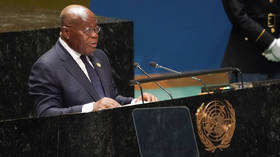British insurance giant apologizes for role in slave trade

British insurance company Lloyd’s of London said it is “deeply sorry” for its strong links to the transatlantic slave trade and will now commit around £52 million ($63.8 million) to a program of initiatives as reparation for its past wrongdoings.
Lloyd’s, which began operating in 1688 as the trade in humans flourished, will invest £40 million ($49.1 million) in slave trade-affected regions and spend around £12 million ($14.7 million) on a diversity program to boost the recruitment of black and ethnic-minority employees in the commercial insurance market, as well as bursaries for black students to study in the UK.
“We’re deeply sorry for this period of our history and the enormous suffering caused to individuals and communities both then and today,” Bruce Carnegie-Brown, Chairman of Lloyd’s said in a statement on Wednesday.
The move comes after independent research discovered that the 335-year-old insurance market played a “significant role” in facilitating the 300-year transatlantic slave trade, labeled by the UN the largest forced migration in history.
More than two million Africans were estimated to have died en route from their countries to the Americas, where slaves were used for forced labor between the years 1500 and 1800.
Research published this month by Black Beyond Data, based at Johns Hopkins University, found Lloyd’s insured the largest slave-ship owners in the early 1800s and also facilitated relationships between slave-ship captains, ship owners, and insurance underwriters. According to the findings of the Mellon Foundation-funded investigation, the organization also actively protested the abolition of the slave trade across the British Empire in 1807. The Black Beyond Data team examined material from Lloyd’s archive, including ledgers where insurers recorded policies for ships leaving Liverpool as part of the trade, according to Alexandre White, assistant professor at Johns Hopkins University.
The firm apologized in 2020 for its historical ties to the slave trade and authorized the independent report, over which it claimed it had no editorial control.
In response to the findings, the British firm said on Wednesday that, while it cannot undo the past, its current interventions will address the vestiges of the trade, including inequalities.
“We’re resolved to take action by addressing the inequalities still seen and experienced by Black and ethnically diverse individuals: which is why we’ve launched Inclusive Futures, a comprehensive programme of initiatives to help these individuals and communities progress from the classroom to the boardroom,” Bruce Carnegie-Brown said.
The move is “completely inadequate,” according to Kehinde Andrews, Professor of Black Studies at the University of Birmingham, who has criticized Lloyd’s of “reparations washing.”
“This is PR: giving an apology, making some commitments, but this is not serious. You’re talking about massive amounts of wealth that they owe back to people,” The Guardian quoted Andrews as saying.
The professor has been quoted by the BBC as saying “If they were serious they would be proposing a transfer of wealth to the descendants of the enslaved, not a diversity scheme for so called ‘ethnically diverse’ people.”
Llloyd’s of London declared a mid-year 2023 profit of about $4.8 billion (£3.9 billion).













